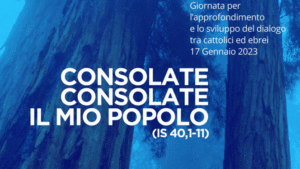Isaiah, prophetic words pointing to a way
 Dozens of meetings across Italy enlivened the 34th edition of the Day dedicated to the deepening and development of dialogue between Catholics and Jews that this year focused on the prophetic passage from Isaiah 40: “Comfort, comfort my people”. Rabbis, scholars, and members of the clergy will discuss this passage. The Italian Rabbinical Assembly in a text prepared for the event, held on January 17th, writes: “The people of Israel, though struck by misfortunes, know that after mourning comes consolation, life resumes, and the bond with the Lord returns to calmer tones, in the hopeful wait for complete redemption: on this path the message is always valid”. A message which is at the same time particular and universal: “These last few years, many negative things happened and we have not yet come out of it. The prophetic passage points to a way, a direction, a consolation, provided that human beings listen to the voice of the Lord and with his guidance understand what their role and their duty are”.
Dozens of meetings across Italy enlivened the 34th edition of the Day dedicated to the deepening and development of dialogue between Catholics and Jews that this year focused on the prophetic passage from Isaiah 40: “Comfort, comfort my people”. Rabbis, scholars, and members of the clergy will discuss this passage. The Italian Rabbinical Assembly in a text prepared for the event, held on January 17th, writes: “The people of Israel, though struck by misfortunes, know that after mourning comes consolation, life resumes, and the bond with the Lord returns to calmer tones, in the hopeful wait for complete redemption: on this path the message is always valid”. A message which is at the same time particular and universal: “These last few years, many negative things happened and we have not yet come out of it. The prophetic passage points to a way, a direction, a consolation, provided that human beings listen to the voice of the Lord and with his guidance understand what their role and their duty are”.
“The period we are living through, marked by the hoped-for exit from the pandemic, that for a long time has weakened the life of the country, including faith communities, pushes us to interrogate ourselves deeply about our presence in the society as men and women who believe in the God of Abraham, Isaac and Jacob”, highlights the Commission for Ecumenism and Dialogue of Italian Bishops’ Conference – CEI. In this sense the passage by Isaiah represents “an announcement of consolation for the people, called to hold still in the faith that the Lord will not abandon them”. We can trust the future, it adds, “because the word of God guarantees us that he is faithful; in Him we find the strength to give credit to life and to be trusting, because we feel that His action precedes and ‘overcomes’ us”. On the occasion of the Day, a subsidy was created that includes a tribute to some of the “testimonies” of the Dialogue: among them former Rabbi of Rome Elio Toaff, protagonist along with Pope Wojtyla of the historic visit of the Pontiff to the Great Synagogue.
“To understand the magnitude of that event, it is useful to refer to the blunt national news of those years”, it reads. “For example, going back to the horrible 1982, when on the drive of the middle-eastern events, and the persisting Israeli-Palestinian conflict, during a trade union demonstration, a coffin was laid near the synagogue (with Toaff denouncing, unfortunately prophetically, the wind of hate). Then a couple of months later, on the 9th of October, the two-year-old Stefano Gaj Taché was killed by shrapnel from a bomb placed there by Palestinian terrorists, which hurt another 37 people at the end of the ceremony for the conclusion of the Sukkot. (Significantly, the president Sergio Mattarella, in his first oath-taking speech, would remember Stefano by name, presenting him as one of our children, an Italian child)”.
The bond with Giovanni Paolo II, it is recalled, “would last over time, so that the rabbi’s name will be the only one to appear in the Pope’s will, along with that of the Pope’s personal secretary. Toaff himself would participate in the solemn funeral of his Catholic friend”.
Translated by Laura Cattani and revised by Annadora Zuanel students at the Advanced School for Interpreters and Translators of the University of Trieste, interns at the newspaper office of the Union of the Italian Jewish Communities – Pagine Ebraiche.
